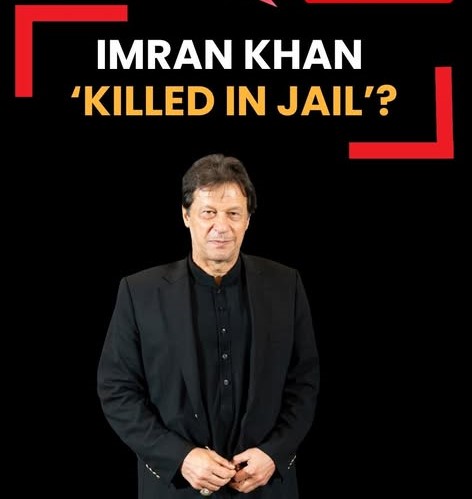Imran Khan Death Rumours Spark Political Storm: Afghan Media Claims, Pakistan Denials, and Midnight Protests Outside Adiala Jail
By: Javid Amin | 26 November 2025
Rumours surrounding former Pakistan Prime Minister Imran Khan’s alleged death in Adiala Jail have triggered a wave of panic, political tension, and widespread misinformation across the region. The story began circulating after several Afghan media outlets and unverified social media accounts claimed that Khan had been “killed” or “assassinated” while in custody.
While Pakistan’s government has officially denied the claim, the refusal to allow Khan’s family, lawyers, or PTI leaders to meet him has intensified suspicion and pushed the controversy into the international spotlight.
Where the Rumour Started: Afghan Media & Viral Social Posts
The spark came from Afghan news platforms and social handles, some of which have previously posted anti-Pakistan content. The following outlets amplified the news:
Indian Outlets Covering the Rumour
-
Zee News – “Imran Khan Killed By Pakistan Army In Adiala Jail?”
-
News18 – Cited Afghan social media as source, stressed “no verification yet”
-
Firstpost – Highlighted Afghan outlet Afghanistan Times claim
-
ABP Live – Reported protests outside Adiala Jail amidst viral rumours
-
GoodReturns – Noted the lack of evidence behind the claims
-
BreezyScroll – Fact-check on unverified ISI involvement claims
These platforms didn’t assert the rumour as fact—they attributed it to Afghan media and publicly circulating posts. But the speed and volume of coverage created a perception of credibility.
Pakistan’s Response: Denials but No Transparency
The Pakistani government released swift statements calling the rumour “fake” and “malicious,” but crucially did not provide any video proof, photographs, or live statements from Imran Khan.
What’s Confirmed
-
No credible Pakistani outlet has confirmed his death.
-
No official footage or updated photos of Khan have been released.
-
Family, lawyers, and PTI leaders were denied access, even after widespread rumours.
-
Security was increased outside Adiala Jail after protesters gathered at midnight.
Why the Denial Isn’t Enough
The absence of a transparent proof-of-life statement has allowed the rumour to continue spreading.
Pakistan’s recurring pattern of information blackouts, prison secrecy, and restricted access—especially since Khan’s arrest—has eroded public trust.
Street Protests: PTI Supporters Gather at Adiala Jail
As the rumour spread across social platforms, PTI supporters, Khan’s family, and lawyers tried to enter Adiala Jail to meet him.
Police blocked access, triggering:
-
Midnight protests
-
Chants accusing the state of suppressing truth
-
Confrontations with security personnel
-
Online campaigns demanding “#ReleaseProofOfLife”
PTI leaders said the denial of visitation is “unprecedented” and “intentional.”
The Bigger Picture: Why This Rumour Exploded
Rumours of political assassinations thrive when:
-
The State tightly controls information
-
Opposition leaders are jailed without transparent processes
-
Courts, media, and institutions appear compromised
With Imran Khan:
-
He has been incommunicado for long periods.
-
His health updates are irregular.
-
His lawyers allege torture and isolation.
-
Journalists are barred from covering prison conditions.
This creates a vacuum—and rumours rush to fill it.
Historical Parallels: Rumours in Authoritarian Contexts
Similar cases include:
-
Benazir Bhutto’s assassination timeline confusion (2007)
-
Nawaz Sharif’s critical health rumours during incarceration (2019)
-
Sheikh Mujibur Rahman’s death rumours before confirmation (1975)
-
Navalny poisoning and prison secrecy in Russia
In each case, lack of transparency fed suspicion, which later turned out to be justified or partially true.
Why Afghan Media Reported It First
Afghan–Pakistan relations are at a low, driven by:
-
Taliban accusations of Pakistani interference
-
Border clashes
-
Pakistan’s deportation of Afghan refugees
-
TTP (Pakistani Taliban) militancy issues
Afghan outlets often highlight stories embarrassing to Pakistan.
This rumour aligned with existing political narratives.
Who Benefits From the Rumour?
1. Anti-Pakistan Groups
The rumour paints Pakistan’s military as oppressive.
2. PTI Supporters
It revives the “Khan is in danger” narrative.
3. Afghan Media Ecosystem
High engagement, political leverage.
4. Pakistani Government?
Not directly—but confusion diverts attention from:
-
Economic collapse
-
Security failures
-
Political instability
What Could Happen Next
Scenario 1: Pakistan Releases Proof of Life
This would calm protests but raise questions about the blackout.
Scenario 2: Continued Silence
Rumours will intensify; international media will pick it up.
Scenario 3: Sudden Prison Transfer or Health Update
This may trigger new speculation.
Scenario 4: International Pressure Builds
UN bodies, human rights groups, and governments may demand access.
Bottom-Line: A Rumour Fueled by Secrecy
The Imran Khan death rumour didn’t spread because Afghan media reported it.
It spread because:
-
Pakistan did not provide verifiable proof of his well-being
-
Family and lawyers were blocked
-
Adiala Jail is under an information lockdown
-
Khan is the most high-profile prisoner in Pakistan
-
Trust in the state is extremely low
Unless Pakistan provides transparency, the speculation will continue—regardless of official denials.


